
21 October 2024
At its October meeting, the European Central Bank (ECB) delivered its second rate cut in as many months and its third of this easing cycle.
The private credit market has grown rapidly in recent years, driven in part by strong demand for direct lending.
Reforms implemented over the past decade along with more credible monetary and fiscal policy have allowed India to begin tapping its catch-up potential and enviable demographics.

After recently announcing new stimulus measures, China’s policymakers have yet to fill in the details on the scale of support planned for tackling issues in housing markets, local governments, and consumer confidence. But with recent press conferences unveiling new commitments, there is clear evidence of a fundamental shift in policy thinking.
Speculating on the precise timing of China’s stimulus isn’t sensible. However, the “three arrows” policy strategy – liquidity, fiscal/credit, structural measures – offers a way forward to boost the economy out of the deflation trap. With further policy meetings in the calendar – the NPC standing committee in a few weeks – we may hear more soon.
As for markets, many Asian investors remain cautious on Chinese stocks, arguing that it will take a long time for capital flows to return. But at 11.5x earnings, China still trades at a heavy discount to EM (14x) and global stocks (21x). With bad news still in the price, good news could be ‘doubly good’ for stocks.
Another way to think about market effects is that China’s stimulus sets up a rotation trade in global stocks. China’s rally has already caused volatility in regional fund flows, affecting markets like India, South Korea, and Japan.
Geopolitical risks have been on the rise in 2024 – but the first question might be, “so what?”. Many investors already feel well-equipped to deal with geopolitical risks. Most of the time, after all, the “geopolitical risk premium” has only a fleeting or transitory influence on investment markets. The effects unwind fairly quickly.
But this time could be different. There are several reasons why investors need to take geopolitics seriously in their asset allocation considerations. First, economic power is diffusing to Asia and the Global South, with profound implications for the macro-economy and the financial system. Second, the global environment has become less friendly to international cooperation. And third, the policies and principles that have stabilised the global order over the last 30 to 40 years seem increasingly obsolete.
It means that the “nice” economic regime now risks being “vile” – or, to spell it out, one of “Volatile Inflation and Limited Expansion”. If left unchecked, it implies rising prices and lower economic growth potential. For investors, portfolio strategy will need to be prepared for such an eventuality and resilient to the implications of shorter business cycles, greater market dispersion, and changed correlations.
The value of investments and any income from them can go down as well as up and investors may not get back the amount originally invested. Past performance does not predict future returns. Investments in emerging markets are by their nature higher risk and potentially more volatile than those inherent in some established markets. The level of yield is not guaranteed and may rise or fall in the future. For informational purposes only and should not be construed as a recommendation to invest in the specific country, product, strategy, sector or security. Any views expressed were held at the time of preparation and are subject to change without notice.
Source: HSBC Asset Management. Macrobond, Bloomberg. Data as at 11.00am UK time 18 October 2024.
At its October meeting, the European Central Bank (ECB) delivered its second rate cut in as many months and its third of this easing cycle. During the summer, the expectation was that it would cut at a pace of 0.25% every other meeting. What has changed? One factor is that the Federal Reserve has become more willing to ease policy. However, there have also been important eurozone developments. First, the latest inflation numbers show tentative signs that service sector inflation is now weakening, having been relatively sticky earlier this year. Wage growth is also softening, supporting the view that inflation pressures are fading. Second, activity data have surprised to the downside – the PMIs point to a deceleration in growth during H2 2024, led by Germany.
With the inflation situation improving, growth looking patchy – particularly in Germany – and the ECB easing policy at a brisker pace, Bunds have been outperforming US Treasuries since mid-September, reversing the trend seen since mid-April.
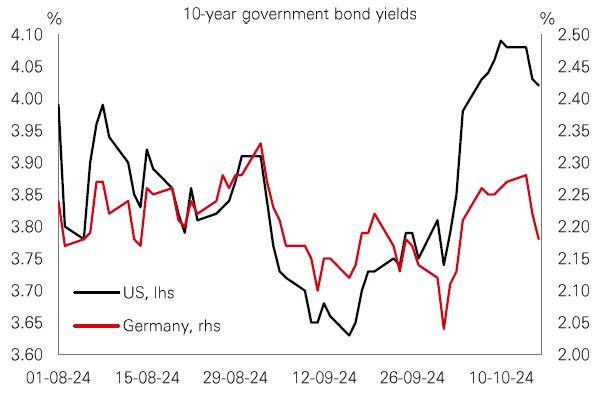
The private credit market has grown rapidly in recent years, driven in part by strong demand for direct lending. There have been two key reasons for this: one is that traditional banks have retrenched from parts of the lending market, leaving private credit managers to fill the void. Another is that direct lending proved popular with private equity managers during the post-Covid deal-making boom.
For private credit investors, the returns have been strong. With an average yield of nearly 12%, the asset class has outperformed other Credits. With the global easing cycle underway, returns are expected to moderate over time, but it’s expected to remain a high yield asset class.
While North America and Europe currently dominate the direct lending markets, Asia is comparatively small – but growing strongly in some areas. With around 80% of total credit in Asia still provided by banks, there is growing demand for alternative sources of finance for fast-growing firms, mergers and acquisitions, and private equity deals.
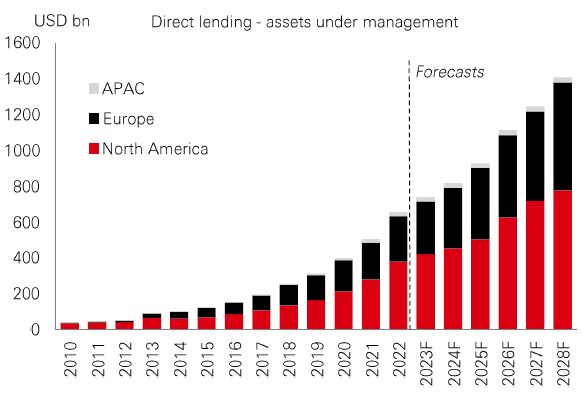
Reforms implemented over the past decade along with more credible monetary and fiscal policy have allowed India to begin tapping its catch-up potential and enviable demographics. The IMF expects India to be the fastest growing G20 economy over the remainder of the decade, with real GDP rising by almost 50% by 2029.
Consistent with the recent strong and expected growth, MSCI India has outperformed MSCI ACWI by a significant margin over the last five years. Importantly, however, the Indian equity market now offers greater diversification and less volatility than in the past – MSCI India now comprises over 150 stocks versus under 80 in late 2019. Moreover, it is not just in the equity space that India stands out – its 10y government yield is among the highest for investment grade issuers and has a low correlation with global bonds. Add in an undervalued INR, which also exhibits less volatility than the average EM currency, and there is a strong case for India to be viewed as an asset class in its own right, rather than simply part of a benchmark.
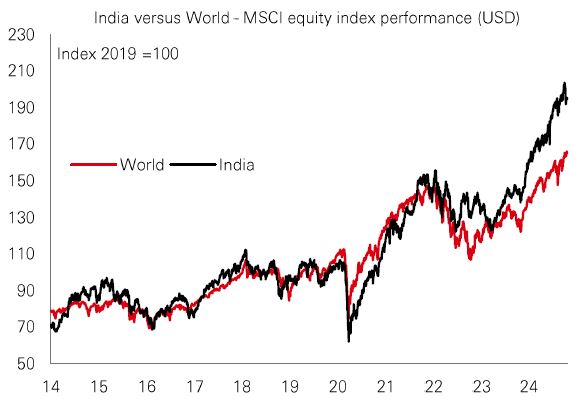
Past performance does not predict future returns. The level of yield is not guaranteed and may rise or fall in the future. For informational purposes only and should not be construed as a recommendation to invest in the specific country, product, strategy, sector or security. Any views expressed were held at the time of preparation and are subject to change without notice.
Source: HSBC Asset Management. Macrobond, Bloomberg, Datastream, Preqin. Data as at 11.00am UK time 18 October 2024.
| Last week |
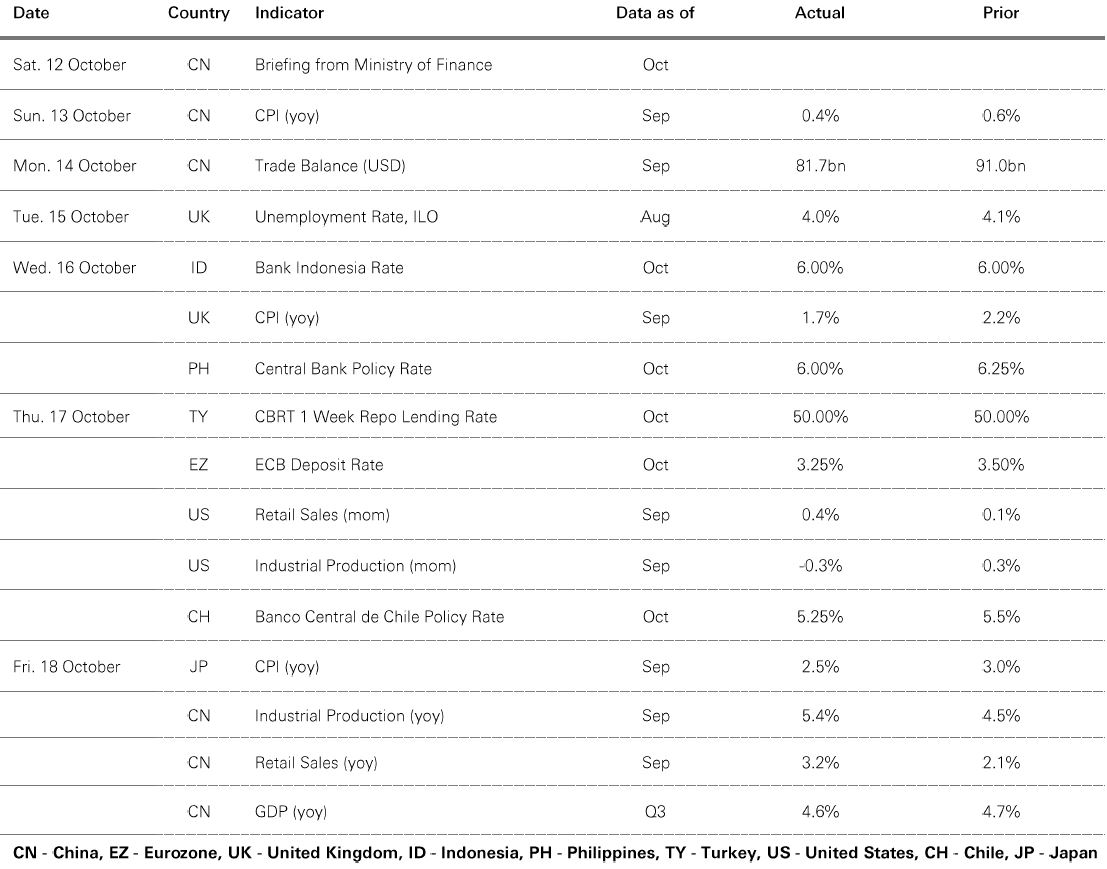
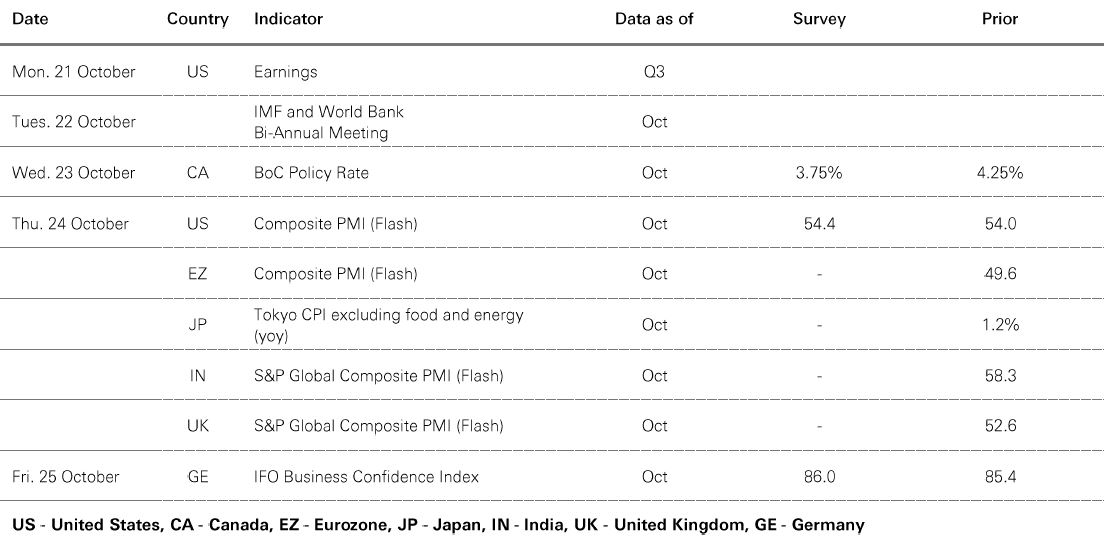
Source: HSBC Asset Management. Data as at 7.30am UK time 18 October 2024. For informational purposes only and should not be construed as a recommendation to invest in the specific country, product, strategy, sector or security. Any views expressed were held at the time of preparation and are subject to change without notice.
A solid increase in US retail sales during September buoyed US Treasury yields towards the end of last week. In stocks, the small-cap Russell 2000 saw the strongest gains, with the large-cap S&P 500 touching new highs, helped by upbeat Q3 earnings news. In Europe, the ECB cut rates by 0.25%, noting that inflation was increasingly under control but warning the outlook for the bloc’s economy was worsening. In Asia, Chinese equities pulled back for a second week following recent rallies, with a slew of macro data releases and policy expectations remaining in focus. India’s Sensex also fell, but some ASEAN markets fared better, with Thai and Indonesian equities ending positively. Brazil’s Ibovespa and Mexico’s IPC were also both on course to finish higher. Elsewhere, the oil price fell on easing fears over tensions in the Middle East. Gold once again reached new highs.
Related Insights

With the US elections less than a month away, the markets’ focus on polls will further...[14 Oct]

The Fed rate cut and its forecast of no recession support market sentiment. We now expect...[1 Oct]


Last quarter proved to be an eventful period for investors, as more central banks embarked...[5 Sep]
This document or video is prepared by The Hongkong and Shanghai Banking Corporation Limited (‘HBAP’), 1 Queen’s Road Central, Hong Kong. HBAP is incorporated in Hong Kong and is part of the HSBC Group. This document or video is distributed and/or made available by HSBC Bank Canada (including one or more of its subsidiaries HSBC Investment Funds (Canada) Inc. (“HIFC”), HSBC Private Investment Counsel (Canada) Inc. (“HPIC”) and HSBC InvestDirect division of HSBC Securities (Canada) Inc. (“HIDC”)), HSBC Bank (China) Company Limited, HSBC Continental Europe, HBAP, HSBC Bank (Singapore) Limited, HSBC Bank Middle East Limited (UAE), HSBC UK Bank Plc, HSBC Bank Malaysia Berhad (198401015221 (127776-V))/HSBC Amanah Malaysia Berhad (20080100642 1 (807705-X)), HSBC Bank (Taiwan) Limited, HSBC Bank plc, Jersey Branch, HSBC Bank plc, Guernsey Branch, HSBC Bank plc in the Isle of Man, HSBC Continental Europe, Greece, The Hongkong and Shanghai Banking Corporation Limited, India (HSBC India), HSBC Bank (Vietnam) Limited, PT Bank HSBC Indonesia (HBID), HSBC Bank (Uruguay) S.A. (HSBC Uruguay is authorised and oversought by Banco Central del Uruguay), HBAP Sri Lanka Branch, The Hongkong and Shanghai Banking Corporation Limited – Philippine Branch, and HSBC FinTech Services (Shanghai) Company Limited (collectively, the “Distributors”) to their respective clients. This document or video is for general circulation and information purposes only.
The contents of this document or video may not be reproduced or further distributed to any person or entity, whether in whole or in part, for any purpose. This document or video must not be distributed in any jurisdiction where its distribution is unlawful. All non-authorised reproduction or use of this document or video will be the responsibility of the user and may lead to legal proceedings. The material contained in this document or video is for general information purposes only and does not constitute investment research or advice or a recommendation to buy or sell investments. Some of the statements contained in this document or video may be considered forward looking statements which provide current expectations or forecasts of future events. Such forward looking statements are not guarantees of future performance or events and involve risks and uncertainties. Actual results may differ materially from those described in such forward-looking statements as a result of various factors. HBAP and the Distributors do not undertake any obligation to update the forward-looking statements contained herein, or to update the reasons why actual results could differ from those projected in the forward-looking statements. This document or video has no contractual value and is not by any means intended as a solicitation, nor a recommendation for the purchase or sale of any financial instrument in any jurisdiction in which such an offer is not lawful. The views and opinions expressed are based on the HSBC Global Investment Committee at the time of preparation, and are subject to change at any time. These views may not necessarily indicate HSBC Asset Management‘s current portfolios’ composition. Individual portfolios managed by HSBC Asset Management primarily reflect individual clients’ objectives, risk preferences, time horizon, and market liquidity.
The value of investments and the income from them can go down as well as up and investors may not get back the amount originally invested. Past performance contained in this document or video is not a reliable indicator of future performance whilst any forecasts, projections and simulations contained herein should not be relied upon as an indication of future results. Where overseas investments are held the rate of currency exchange may cause the value of such investments to go down as well as up. Investments in emerging markets are by their nature higher risk and potentially more volatile than those inherent in some established markets. Economies in emerging markets generally are heavily dependent upon international trade and, accordingly, have been and may continue to be affected adversely by trade barriers, exchange controls, managed adjustments in relative currency values and other protectionist measures imposed or negotiated by the countries with which they trade. These economies also have been and may continue to be affected adversely by economic conditions in the countries in which they trade. Investments are subject to market risks, read all investment related documents carefully.
This document or video provides a high level overview of the recent economic environment and has been prepared for information purposes only. The views presented are those of HBAP and are based on HBAP’s global views and may not necessarily align with the Distributors’ local views. It has not been prepared in accordance with legal requirements designed to promote the independence of investment research and is not subject to any prohibition on dealing ahead of its dissemination. It is not intended to provide and should not be relied on for accounting, legal or tax advice. Before you make any investment decision, you may wish to consult an independent financial adviser. In the event that you choose not to seek advice from a financial adviser, you should carefully consider whether the investment product is suitable for you. You are advised to obtain appropriate professional advice where necessary.
The accuracy and/or completeness of any third party information obtained from sources which we believe to be reliable might have not been independently verified, hence Customer must seek from several sources prior to making investment decision.
Important Information about HSBC Global Asset Management (Canada) Limited (“AMCA”)
HSBC Asset Management is a group of companies, including AMCA, that are engaged in investment advisory and fund management activities, which are ultimately owned by HSBC Holdings plc. AMCA is a wholly owned subsidiary of, but separate entity from, HSBC Bank Canada.
Important Information about HSBC Investment Funds (Canada) Inc. (“HIFC”)
HIFC is the principal distributor of the HSBC Mutual Funds and offers the HSBC Mutual Funds and/or the HSBC Pooled Funds through the HSBC World Selection® Portfolio service. HIFC is a subsidiary of AMCA, and indirect subsidiary of HSBC Bank Canada, and provides its products and services in all provinces of Canada except Prince Edward Island. Mutual fund investments are subject to risks. Please read the Fund Facts before investing.
®World Selection is a registered trademark of HSBC Group Management Services Limited.
Important Information about HSBC Private Investment Counsel (Canada) Inc. (“HPIC”)
HPIC is a direct subsidiary of HSBC Bank Canada and provides services in all provinces of Canada except Prince Edward Island. The Private Investment Counsel service is a discretionary portfolio management service offered by HPIC. Under this discretionary service, assets of participating clients will be invested by HPIC or its delegated portfolio manager, AMCA, in securities, including but not limited to, stocks, bonds, mutual funds, pooled funds and derivatives. The value of an investment in or purchased as part of the Private Investment Counsel service may change frequently and past performance may not be repeated.
Important Information about HSBC InvestDirect (“HIDC”)
HIDC is a division of HSBC Securities (Canada) Inc., a direct subsidiary of, but separate entity from, HSBC Bank Canada. HIDC is an order execution only service. HIDC will not conduct suitability assessments of client account holdings or of the orders submitted by clients or from anyone authorized to trade on the client’s behalf. Clients have the sole responsibility for their investment decisions and securities transactions.
Important Information about the Hongkong and Shanghai Banking Corporation Limited, India (“HSBC India”)
HSBC India is a branch of The Hongkong and Shanghai Banking Corporation Limited. HSBC India is a distributor of mutual funds and referrer of investment products from third party entities registered and regulated in India. HSBC India does not distribute investment products to those persons who are either the citizens or residents of United States of America (USA), Canada, Australia or New Zealand or any other jurisdiction where such distribution would be contrary to law or regulation.
The following statement is only applicable to HSBC Bank (Taiwan) Limited with regard to how the publication is distributed to its customers: HSBC Bank (Taiwan) Limited (“the Bank”) shall fulfill the fiduciary duty act as a reasonable person once in exercising offering/conducting ordinary care in offering trust services/ business. However, the Bank disclaims any guarantee on the management or operation performance of the trust business.
The following statement is only applicable to PT Bank HSBC Indonesia (“HBID”): PT Bank HSBC Indonesia (“HBID”) is licensed and supervised by Indonesia Financial Services Authority (“OJK”). Customer must understand that historical performance does not guarantee future performance. Investment product that are offered in HBID is third party products, HBID is a selling agent for third party product such as Mutual Fund and Bonds. HBID and HSBC Group (HSBC Holdings Plc and its subsidiaries and associates company or any of its branches) does not guarantee the underlying investment, principal or return on customer investment. Investment in Mutual Funds and Bonds is not covered by the deposit insurance program of the Indonesian Deposit Insurance Corporation (LPS).
THE CONTENTS OF THIS DOCUMENT OR VIDEO HAVE NOT BEEN REVIEWED BY ANY REGULATORY AUTHORITY IN HONG KONG OR ANY OTHER JURISDICTION.
YOU ARE ADVISED TO EXERCISE CAUTION IN RELATION TO THE INVESTMENT AND THIS DOCUMENT OR VIDEO. IF YOU ARE IN DOUBT ABOUT ANY OF THE CONTENTS OF THIS DOCUMENT OR VIDEO, YOU SHOULD OBTAIN INDEPENDENT PROFESSIONAL ADVICE.
© Copyright 2024. The Hongkong and Shanghai Banking Corporation Limited, ALL RIGHTS RESERVED.
No part of this document or video may be reproduced, stored in a retrieval system, or transmitted, on any form or by any means, electronic, mechanical, photocopying, recording or otherwise, without the prior written permission of The Hongkong and Shanghai Banking Corporation Limited.
Important information on sustainable investing
“Sustainable investments” include investment approaches or instruments which consider environmental, social, governance and/or other sustainability factors (collectively, “sustainability”) to varying degrees. Certain instruments we include within this category may be in the process of changing to deliver sustainability outcomes.
There is no guarantee that sustainable investments will produce returns similar to those which don’t consider these factors. Sustainable investments may diverge from traditional market benchmarks.
In addition, there is no standard definition of, or measurement criteria for sustainable investments, or the impact of sustainable investments (“sustainability impact”). Sustainable investment and sustainability impact measurement criteria are (a) highly subjective and (b) may vary significantly across and within sectors.
HSBC may rely on measurement criteria devised and/or reported by third party providers or issuers. HSBC does not always conduct its own specific due diligence in relation to measurement criteria. There is no guarantee: (a) that the nature of the sustainability impact or measurement criteria of an investment will be aligned with any particular investor’s sustainability goals; or (b) that the stated level or target level of sustainability impact will be achieved.
Sustainable investing is an evolving area and new regulations may come into effect which may affect how an investment is categorised or labelled. An investment which is considered to fulfil sustainable criteria today may not meet those criteria at some point in the future.